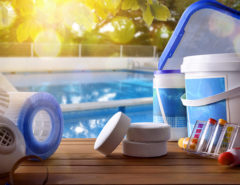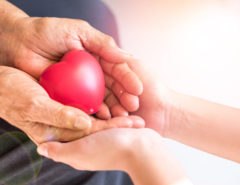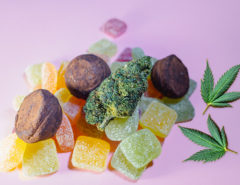June is National Healthy Homes Month. It is a time when families can take steps to protect themselves from dangers in their home. In the spirit of this celebration, we at the Maryland Poison Center would like to provide you with tips that you can use to make sure your home is poison-safe.
Medicines

Can you tell which are medicines and which are candies in this photo?
Let’s start with medicine. Medicines must be stored up, away, and out of sight of young kids, teens, and visitors. Put medicine back in its proper storage location after each dose. Leaving medicine on the counter can seem convenient, but it increases the chance that a child will get into it. While child-resistant caps can help keep young kids out of medicines, those caps are not child-proof. Given enough time, many children will be able to get the bottle open. Never call medicine candy. And, never keep medicine in baggies—young children often associate baggies with treats
Download our medicine safety information sheet for more tips about safe medicine storage. The Up & Away website also offers helpful tips to help you store medicines correctly.
Household Products

It’s easy to see how a young child could confuse these bottles of apple juice and household cleaner.
Proper storage of household cleaners, chemical, and garden products is just as important as it is for medicines. In most cases, keeping these products up, away, and out of sight is good enough. Some products that should be stored in a locked cabinet are paint strippers, drain cleaners, and products for your car. Call your poison center for a more detailed list.
Do not store household products near food, and always keep them in their original containers. Storing these products in old food containers or beverage bottles can lead to confusion and potentially tragic outcomes. Mixing household cleaners can also create dangerous fumes. If more than one product is needed to clean, make sure you rinse the first away thoroughly before using the second.
Plants
Know the names of all of your indoor and outdoor plants. Avoid picking berries with young children until they are old enough to understand that not all berries outside are safe to eat. Teach children that sometimes those berries might look like the ones they had as a snack, but they may actually be poisonous. Make sure that children know to check with a grown-up before putting any plants or berries in their mouth.
If you need to find out if a plant is harmful, our poisonous plants list is a good place to start. But, just because a plant is not on our list doesn’t mean that it is non-toxic. Some of these plants cause mild symptoms like a rash, while others can have more severe symptoms. You can always call your local poison center at 1-800-222-1222 if you think a child (or adult) might have eaten a poisonous plant.
Carbon Monoxide
Carbon monoxide can be a danger any time of year. The incomplete burning of fuel such as natural gas, gasoline, kerosene, oil, wood, or charcoal forms this colorless, odorless gas. Check gas and oil appliances and fireplaces to make sure they are in working order. Carbon monoxide detectors are also a must for all homes. Place the detector somewhere it will wake you up if it alarms.
In the summer, make sure gas and charcoal grills are 10 feet away from windows and doors. Never grill inside the garage, even if the door is open. More grill safety tips are available on the Consumer Product Safety Commission’s website.
To learn more about carbon monoxide, including signs of carbon monoxide poisoning, download our information sheet.
Swimming Pools
If you have a swimming pool, read product labels and follow directions exactly. Open chemical containers in a well-ventilated area. Make sure your face is not near the container. Also, consider using safety goggles and gloves when handling these products. Always store pool chemicals in original containers. Make sure children and pets stay away from the area when you use these chemicals.
The Centers for Disease Control and Prevention has other great safety tips that families can follow to prevent pool chemical-related health events.
Start Poison Proofing Your Home
We want your home to be poison-safe. Use our poison safety checklist to get started. Poison experts — pharmacists and nurses with special training in toxicology — are available 24/7 for emergencies, and to provide information in non-emergency situations.
Text “poison” to 797979 to add the poison center’s phone number (1-800-222-1222) to your contacts.





Leave a Reply